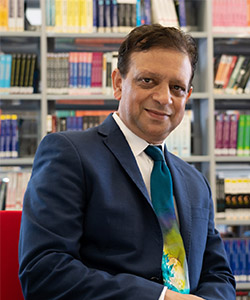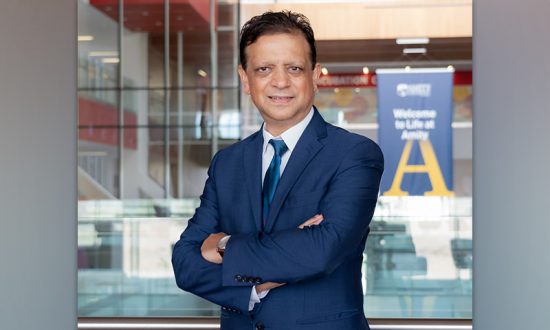A seasoned academic, practitioner and technology enthusiast, Dr. Fazal Malik is Professor of Media Studies and Dean of Humanities, Arts and Applied Sciences at Amity University in Dubai. Before joining Amity University, he served as Associate Dean in the Division of Applied Communication at the Higher Colleges of Technology in the UAE. He has PhD in Media Studies from Nottingham Trent University (UK) and holds a Master’s Degree in International Journalism from City University, London.
The higher education in the UAE is limping back to normalcy. However, this is not pre-COVID-19 normalcy, but a new normal that we hardly imagined or were prepared for. Nonetheless, universities are opening doors to the freshmen and returning students in a staggered manner, adopting blended learning approaches and following strict protocols to ensure safety and wellbeing of all. This new educational reality, nevertheless, has given the educational leaders a lifetime opportunity to embrace and invest in the change to transform learning and teaching. But not all universities understood the gravity of the situation.
The problems faced by the universities have been more or less identical, but the responses to these problems have quite eclectic. Globally, the reactions by the institutions of higher education to the COVID-19 crisis can be summarized into three categories:
- The universities which embedded their heads in the sand and behaved as if, ‘nothing was wrong’
- The universities which waited for ‘Godot’ who never arrived to take them out of the trouble
- The universities that proactively engaged with the new reality
Amity University in Dubai, known for its innovative approach, engaged with all stakeholders from day one to develop strategies to provide an uninterrupted learning experience to the students. The last eight months of gruelling experience of developing, delivering and assessing learning in an awe-inspiring situation gave us the confidence not only to provide seamless learning online but an assurance to open our campus for the new academic year. On the 16th of September, 2020, after months of preparation, we opened our gates to the new and existing students to offer blended learning on and off-campus.
With the face masks on and body temperature monitored, maintaining social distance and adhering strictly to the health and safety protocols announced by various government agencies and regulators in the UAE, students are back on campus in a staggered manner. Life is returning to campus. This would have not been possible without the coordinated efforts of various stakeholders, especially the government of the UAE. In fact, the Knowledge and Human Development Authority which regulates all educational institutions in Dubai developed a comprehensive list of 117 standard operating procedures covering 16 critical areas to be followed to qualify for reopening the schools, colleges and universities. Similarly, the Ministry of Higher education in the UAE came out with 78 pages comprehensive document instructing educational institutions on how to ensure health and safety of all. This did not stop there, but every institution has been visited ample times to make sure that schools and universities are ready. This has been followed up by surprise visits and fines in case protocols are violated. This cautious and structured approach is the hallmark of the governance in the UAE and has given the students, parents and the teachers the confidence that to reopen campuses.
Way back in February 2020 when the educational institutions were closed due to the spread of COVID-19 infection, Amity University Dubai delivered all classes online in both synchronous and asynchronous mode, providing students with the real-time learning experience from the safety of their homes. Ensuring quality in assessing student learning, Amity University became the first institution in the Middle East to conduct all exams for all semester using the innovative open-book cases study approach. In a mammoth online initiative, Amity University conducted exams for nearly 2000 students from 38 different programmes in Engineering, Sciences, Business, Arts, Humanities and Social Sciences in nearly 400 courses using MS Teams platform. Now the results are out, and the success of this project is inspiring other universities to conduct exams similar way if the pandemic does not allow the proctored face to face exams on university campuses.
Looking back at the last 9 months, the change has been dramatic. We are in a new phase, where new pedagogies are finding a way to replace age-old methods of teaching and learning. Student-centric learning approaches, increased use of technology and integration of eclectic delivery platforms have created a new ecosystem of education. The physical embodiment of classroom like a proscenium arch of a theatre is giving way to a wall-less, omnipresent, space where the students engage in learning anytime, anywhere, removing the Spatio-temporal constraints that held back learning.
It was not an easy task. While the technology-savvy students quickly embraced the new way of learning, there were many bottlenecks, both institutional and human. There was chaos in the beginning as many universities were shopping for platforms without realizing the importance of the content to be delivered in the confusion of delivering online learning. In this mayhem, people were trying everything to find the best platform, and this disproportionate focus on the medium rather on the message proved Marshal McLuhan’s prophecy of ‘medium is the message’ true in an ironic way. Fortunately, at Amity University in Dubai, we had started the Flipped Learning Project from the mid of 2019 and had created nearly 400 hours of curriculum-centric rich content in high-definition videos using our media studies studio. These videos were streamed for students to access anytime, anywhere, that proved to be an advantage to the students who could watch the videos in their own time and discuss the issues raised in the online class with their peers and teachers. This approach also provided the students with an opportunity to engage in learning activities rather than listening passively to lectures from the teachers. The teachers, in turn, developed creative assessment like role plays, online quizzes and simulations to assess learning. The Flipped Learning experience has further improved our ways to engage with the new educational ecosystem, and the project has now been further diversified to get 1000 hours of educational content ready by the end of 2020.
From a global perspective, the coronavirus crisis hit at a time when the higher education sector was a going through a challenging time but in the UAE with its liberal laws, supportive government and focus on the knowledge economy, the higher education sector has been flourishing. Dubai International Academic City (DIAC) and Dubai Knowledge Park (DKP) with its mandate to develop human capital in the region, hosts 24 global academic institutions which offer around 450 different certificate, diploma, undergraduate, and post-graduate programmes to more than 25,000 students from 149 nationalities. Similarly, University City in Sharjah has around 20,000 students studying at 15 universities. Private universities in Abu Dhabi, Ajman and Ras Al Khaimah also have a potential to host students from the Middle East, South Asia and South-East Asia. The UAE is relatively a new entrant in the global higher education market, but the geographic, economic and cultural proximity of South Asian countries to the Gulf region has made it a natural choice for students from neighbouring areas to pursue higher education here. The interest of the International students in studying in the UAE is further enhanced by the announcement of UAE government to allow international students to pursue work-based learning and an opportunity to apply for jobs and work along with ease of travel.
At the same time, tighter immigration policies, the rise of far-right and post-Brexit fears along with the abolition of post-study work visas has been affecting the flow of students to the US and the UK universities. This opened up opportunities for UAE institutions to attract more students. Now the travel restrictions due to Covid-19 pandemic has made many parents, especially from Asia, wary of sending their children to far off places. The UAE being 3-4 hours flight is seen as an attractive alternative.
Nevertheless, the institutions of education in the UAE, like anywhere else in the world, have not been immune to the pandemic of coronavirus. However, the response of the leadership of the UAE, governmental agencies and the educational managers has been exemplary to continue delivering education through challenging times and now make sure the schools, colleges and universities open in a safe and secure environment.
Now in the 4th week of opening of our campus for 2020-21 academic year, as the fresh admissions are picking up and the registrations of returning students peaking, there is growing confidence that the ‘new normal’ will be a continuation of the path of innovation and modernization that will redefine the way we engage our students in learning and acquiring skills that prepare them to deal with the uncertainties of life and the unpredictabilities of changing job market.
About Dr Fazal Malik

Dr Fazal Malik has over two decades of international experience in educational management, media entrepreneurship and lifelong learning. Dr Fazal is passionate about the use of technology in education and writes regular columns on knowledge economy and technology-enabled learning for the local newspapers in the UAE. Before making a transition into academia, he worked as a Broadcast journalist for the BBC and established a number of learning platforms, including community broadcasting stations in the UK.
Dr Fazal successfully launched the flipped learning project at Amity University in Dubai in 2019 which enabled students to access learning anytime, anywhere during the current Covid-19 pandemic. He developed innovative assessment strategies to map learning outcomes in both synchronous and asynchronous online learning environments.




